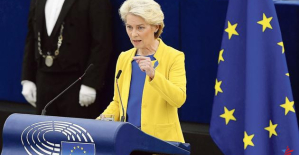Following the victory of the union of the rights led by Giorgia Meloni in the legislative elections on Sunday, a new government will be appointed, but in Italy the path between the two can be tortuous and drag on. In the past, this process has taken between just under four and twelve weeks. In general, the clearer the result of the ballot, the shorter the delay, even if certain stages are incompressible.
In the meantime, it is certain that Italy will be represented by resigning Prime Minister Mario Draghi at the informal summit of EU Heads of State and Government in Prague on October 7. Discover the next steps of the political process in Italy after the legislative elections:
SEE ALSO - Giorgia Meloni: the rhetoric of a former admirer of Mussolini
The Ministry of the Interior publishes on its website the official results of the counting of the ballots as they arrive and the final result or almost should be known Monday during the day.
For the time being, at 8 am, the union of the rights has won more than 44% of the votes in the Chamber of Deputies and the Senate. 11.5 million voters trusted the coalition. The centre-left union is far behind, with 26% of the vote, or nearly 7 million voters.
Then, the newly elected members of the Senate and the Chamber of Deputies must, according to the Constitution, meet within 20 days after the holding of the elections, that is to say on October 15 at the latest. At their first plenary meeting, they must elect their respective presidents and only then does the process of appointing the government begin.
In Italy, the political tradition is that the President of the Republic begins consultations on the appointment of the new head of government by the presidents of the two chambers, followed by the leaders of the main parties and possibly the leaders of the parliamentary groups. If the election result is clear, these consultations are brief - around two days - but if not, they can last up to a week, after which the Head of State appoints a personality to form a new government.
The latter accepts the mandate "with reservations", begins negotiations with its allies concerning ministerial posts and the program. At the end of these negotiations, if all goes well, the prospective candidate goes to the president and “raises his reservation”.
The new government is then announced immediately and is sworn in before the President of the Republic the same day or the next day at the latest, after which it goes to Palazzo Chigi, the seat of the executive, for the transfer of power with the outgoing government.
Two records have been set in recent history: Silvio Berlusconi needed only 24 days in 2008 to move into Palazzo Chigi, while Giuseppe Conte took no less than 89 days in 2018 to achieve the same journey.
SEE ALSO - Victory of Giorgia Meloni in Italy: the reactions of the French political class










